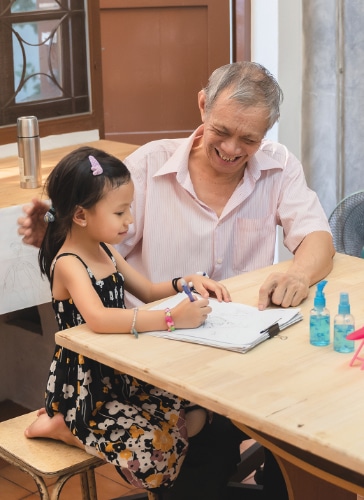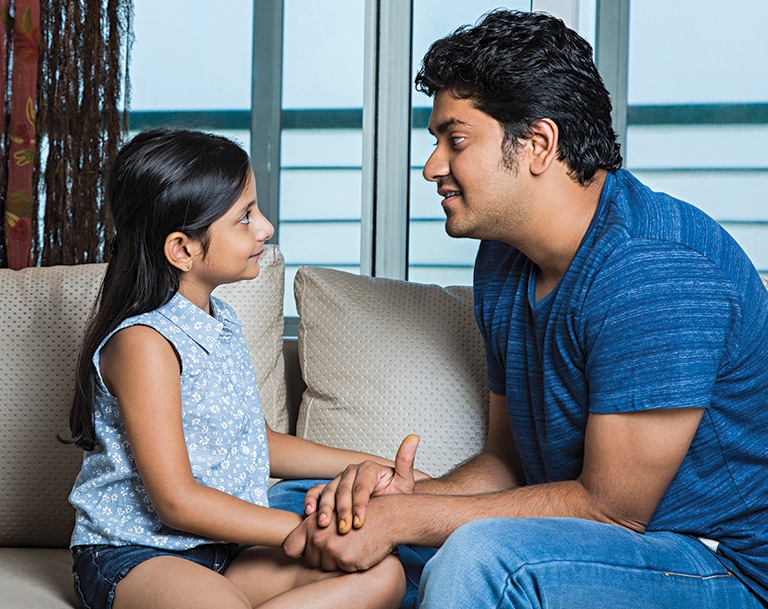Raising Children While Caring for Elderly Parents

Raising children while caring for your parents is a special kind of balancing act. Your senior may feel like they’re in the way. Your kids may act out when they sense that you are stressed about the responsibilities. Some reasons why your children might act out are:
- Anxiety about changes in the family dynamic
- Sadness about the changes they see in their grandparents
- Feeling ignored when the parent’s attention is elsewhere
- Sensing they’ve been demoted in the family hierarchy
- Fear of what might happen in the future
| While adults can reason away most of these fears, children do not yet have the same coping mechanisms. As their parents, it’s important to give them the tools to handle change and chaos. Here are some ideas to help you get a handle on the stress: |
 | Breathe! This may seem obvious, but studies have shown that when someone is stressed, they can forget to breathe. Taking mindful breaths will help increase oxygen to your brain and help you make better decisions. |
 | Look into institutional help. Often school social workers, guidance counselors, or your faith communities can suggest services to help ease the burdens. |
 | Say “Yes!” when someone offers to help. Let them take your children and/or your parents for an outing to give you a couple of hours to collect yourself. |
 | Share your concerns with your children, keeping it age appropriate. Your children will benefit from a solid discussion about what is happening with their grandparent and may even have ideas for how they can help. “Helping” is one way to ease their own fears and give them a sense of control. |
 | Make yourself a priority. It is hard to find the time or the energy but a little self-indulgence each day will help ease the edges of a rough time. Even if it’s just a piece of chocolate, a half-hour soak in the tub, or a call with a trusted friend. |
 | Allow your parent to participate in decisions about their care. If appropriate, discuss with them the challenges of a multi-generational family and allow them to help out. Perhaps they are slower at housework, but that doesn’t mean that they can’t or are unwilling to help out. |
 | Hire help. Having someone take care of the cleaning, grocery shopping, or other household tasks is not a sign of weakness, but a sign that you are putting yourself on the priority list. |
Intergenerational Programs
 Especially as adults are living longer and, for the most part, healthier lives, it is important to help give meaning to those later years. Eighty-three percent of older adults have expressed a desire to volunteer or perform community service to continue being a viable part of society. Intergenerational programs can help fill a void, both for seniors and youth.
Especially as adults are living longer and, for the most part, healthier lives, it is important to help give meaning to those later years. Eighty-three percent of older adults have expressed a desire to volunteer or perform community service to continue being a viable part of society. Intergenerational programs can help fill a void, both for seniors and youth.
Intergenerational programs offer multiple generations services at the same location. Examples include retirement communities with on-site childcare and housing for grandparents who are raising their grandchildren.
The number of single-parent families and the need for parents to work outside of the home continue to rise. The experience and time that a grandparent or older relative might have to give while parents are working can be a huge benefit.
Intergenerational programs can benefit older adults through improved physical and mental health, enhanced socialization, improved sense of self-worth, and increased independence. Those with dementia have experienced lowered levels of agitation, improved attitudes about other generations and, often, delayed necessity for entrance into care facilities.
Children benefit through enhanced social skills, increased stability, a growth in empathy, lower levels of aggressive or anti-social behaviors, and improved academic performance.
It is hard to be the sandwich generation, caught between the family that raised you and the family you are raising, but there are ways to make it work and even to make it an enriching time in all of your lives.
Source: Commission on Affordable Housing and Health Facility Needs for Seniors in the 21st Century
How to Talk with Children about Aging Relatives

- Keep it age appropriate but honest.
- If an illness or disease is involved, let them know that no one caused it. Children sometimes think they are to blame.
- Help them understand that sadness and anger are normal. Offer them appropriate outlets for these feelings.
- Let them help brainstorm fun activities that the family can do together (crafts, music, photo albums, story time).
Activities for Children and Seniors

- Take a walk
- Feed the birds
- Sit on a bench or swing
- Listen to music
- Look at photo albums
- Play board games
- Read
- Do crafts, paint, or draw
- Brush hair or do nails
- Bake cookies or bread
Source: Alzheimer’s Association
Need Help With A Senior Parent?Being the sandwich generation can be difficult, and it’s great when you can get some support with caring for your loved ones. If you would like a helping hand, we are here for you. Seniors Helping Seniors® is an in-home care and companionship service, and we are here for your senior’s personal care, when you can’t be there®. Our caregivers can also assist with cooking, run shopping errands, do light housekeeping, provide transportation, and much more. We service all of Southwest Broward County, Florida. |


